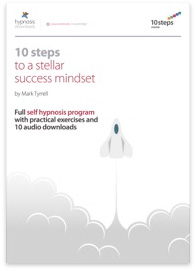How to avoid setting the wrong goals
Why success can bring bitter disappointment and how to ensure that doesn't happen to you
 Roger Elliott, co-founder Hypnosis Downloads
Roger Elliott, co-founder Hypnosis DownloadsListen to this Audio Insight using the player below or download it to listen later. Or, if you prefer to read, scroll down to see the audio transcript.
Listen to this podcast above or read the transcript below.
Hi, and welcome to your Audio Insight on the importance of avoiding disappointment when you reach your goals successfully.
This is an aspect of goal setting that is so often overlooked but is really important when it comes to maximizing life satisfaction and happiness.
Years ago I was watching a documentary about the creator of fictional spy James Bond. After a lifetime of only so-so success as a writer, Ian Fleming started writing his James Bond books and eventually, as we all know, they became massive bestsellers.
One of Fleming's friends asked him what success was like, and apparently he replied: "It's just so much dust, dear boy..."
This really struck me as interesting. Now it may have just been Fleming's British bravado or understatement, but it might also have been how Fleming really felt about the reality of achieving the kind of success he had attained.
Maybe this hotshot spy wordsmith really did feel disappointed in some sense. He certainly drank and gambled and womanized his way to an early death in 1964, just as the Bond movies were taking off...
But it's not just him. Countless people have been shocked to find that achieving what they set out to achieve left them feeling strangely empty. It's as if they had pursued their ambitions on the unquestioned assumption that, once those ambitions had been realized, everything in their life would become wonderful for all time.
So they became millionaires, or won their gold medal or published their novel and yes, it felt fantastic... for a while. But being rich, or recognized by strangers in the street, or respected by society, was somehow not all it was cracked up to be. The guarantee of lifetime happiness they had subconsciously taken for granted would automatically accompany their success just didn't materialize.
Your expectations and post-success depression
Every day in the gossip columns and the buzz of social media we see the fallout from the unhappiness of multitudes of millionaire malcontents, all of whom at one time had expected all (or at least most) of their problems to vanish once their dreams had come true. I've often heard people say they felt happier on their way up to success than when they actually arrived.
As I speak these words, we are just about to release our new 10 Steps to a Stellar Success Mindset which helps you adopt all the conscious and subconscious attitudes to maximize your chances not just of success, but of true satisfaction with life once that success is reached.
To be disappointed you have to have expectations.
That sounds obvious, but the first thing you can do is examine your expectations. What do you imagine, and therefore expect, that life will actually be like once you have the kind of life you want?
Really think about that. If you plan to make money, or get to the top of your game in a creative, sporting, political or business sphere, what had you been imagining life would be like once these goals had been realized?
Had you been assuming you'd have no further problems in life? That you'd never be bored again? That you'd never feel anxious about anything again, or lonely? That you'd never have health problems?
What you really need to be happy
It comes as a real body blow shock to some people that, even when they have achieved their dreams, they are still troubled by some aspects of life.
The fact is, we all have a variety of physical and emotional needs that can only be properly met from different parts of life. For example, beyond the obvious needs for food, water and shelter, you and I and everyone in the world have deep-seated needs for:
- Attention - both to give and receive it
- A feeling of safety and security in our lives
- A sense of control over our lives
- Intimacy with at least one other human being
- Fun and creativity to make life enjoyable
- Challenge and development so we can avoid boredom
- Connection to a wider community
- Some privacy and time to think our own thoughts
- A sense of status, with a recognizable and appreciated role in life
- A sense of competence and achievement to keep our self esteem healthy
- And we need to feel that life is truly meaningful, so we have a real purpose to our days.
Most of us are not consciously aware of these needs. But now you are consciously aware of them. This gives you a huge advantage. And although we might not be consciously aware of them, these needs are so deep within us that we will still strive to meet them, sometimes in healthy ways and sometimes in not so healthy ways.
The important thing, the really important thing, I want you to understand is that even once you have achieved whatever successes you are pursuing, you'll still have to work at getting these needs met.
You might have a huge house in the country, with a swimming pool and a fancy car but, unless you feel that your life has meaning, that you are being creatively challenged, that you are connected to the community, and so on, then you will struggle to feel happy and you may feel a bewildered disappointment with your success.
I train people to meet their needs in lots of different ways. This means they can avoid 'putting all their eggs in one basket'. So, for example, me earning a million dollars might meet my need to feel successful, and enable me to travel and have nice things in life, but I'll still need to nurture intimacy with my loved ones, and find creative challenges to avoid boredom (which by the way can be a common side effect of success), and keep up a good social life, and so on. My money alone will not meet those needs, no matter how much of it I have.
I might have to meet these needs completely outside the field of my success, and in fact it's better if I do so. Remember, if you lose that basket with all your eggs in it, you'll end up with no eggs.
Two things to remember as you continue to strive for success
So the simple take away from this audio insight is twofold.
First, really think about just what you are expecting from your future planned success. How are you imagining life will be once your dreams have been fulfilled?
And secondly, as well as making plans for your success, remember that your future life will need to fulfil all kinds of needs for you that need to be met regardless of the lifestyle your success brings you. You'll also need to make sure your future successful lifestyle doesn't actually block the satisfaction of your needs - an effect celebrities have often reported when they find themselves disconnected from their community.
Keep what I've said here in mind and you'll not only avoid future disappointment but also maximise your enjoyment of future successes.
All our Audio Insights are available within the Growth Zone, the Hypnosis Downloads.com members' section.
You can read more about 10 Steps to a Stellar Success Mindset here.
10 Steps to a Stellar Success Mindset course
Let hypnosis drive success habits deep into your unconscious mind...







